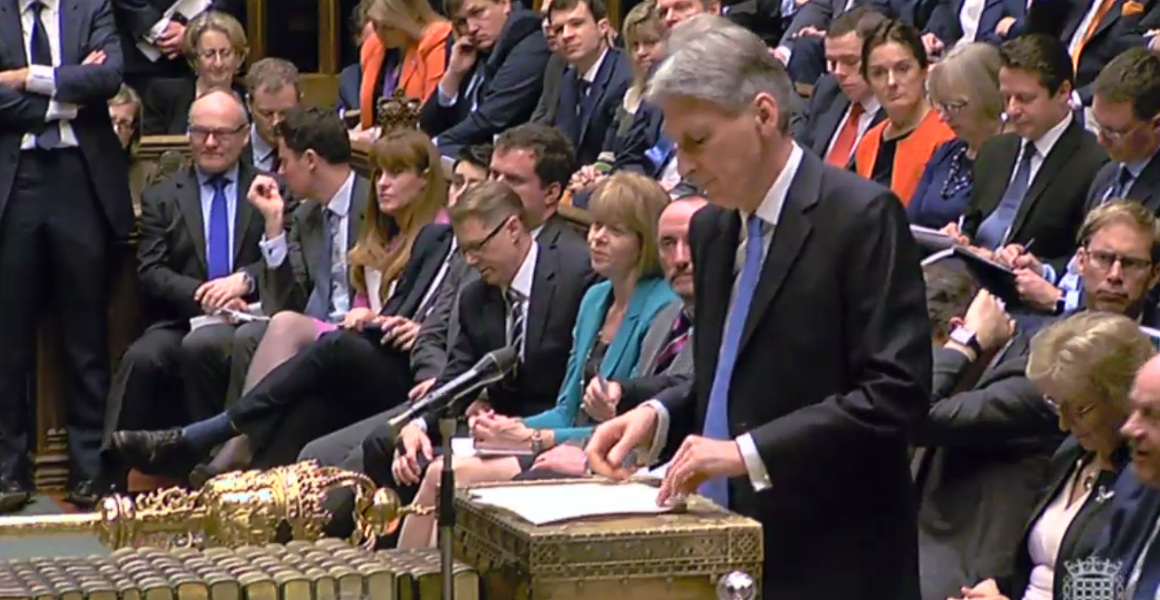Convenience retailers, trade groups and suppliers responded to the Government’s autumn budget with approval, anger and criticism.
An increase in the national minimum wage, a freeze on most alcohol duty, reduced business rates rises and an above inflation tobacco tax increase were the main points that got the industry talking.
Click here to find out more about the changes or read below for the industry reaction.
Two year freeze on nearly all alcohol duty
“We will toast The Chancellor with a gin and Franklin's Tonic this Christmas and make the most of it until the sugar tax comes in force in April!” – Steve Perez, Global Brands founder
“We are also pleased the Chancellor has heeded our advice to delay future alcohol duty changes until 1st February each year so retailers are not burdened with changes prices during the busy Christmas period.” – James Lowman, ACS CEO
“This year’s cut will support continued innovation and investment, create new jobs, attract tourists and ultimately benefit our beer-loving nation. This is a wonderful achievement secured through cross-industry work.” – Bruce Ray, Calsberg UK vice president of corporate affairs
“I would have liked to have seen minimum unit pricing for the whole country announced now that Scotland has done it.” – Jimmy Patel, Jimmy’s Store (Premier), Northampton
A new higher duty band for 6.9-7.5% strength cider
"We would remind the Chancellor that 'white cider' represents around 0.27% of total alcohol sales… [White cider drinkers] will forgo enjoying a drink or they will simply switch to another category. When drinkers switch from cider they choose higher strength wines and spirits – A spokesperson for Frosty Jack’s manufacturer, Aston Manor
Tobacco duty increase
“Every time the Chancellor increases tobacco duties he drives more consumers to the illicit market and away from local shops. Last year we saw lost tobacco tax revenue to the exchequer increase by £100million.” – James Lowman, ACS CEO
“It will simply drive more and more customers to the illegal market and allow organised criminals to prosper at the expense of hardworking legitimate retailers. This year has already seen the imposition of plain packaging and the ban on smaller tobacco packs, the last thing the Chancellor should have done is raise tobacco duties for the second time.” – Suleman Khonat, Tobacco Retailer’s Alliance spokesperson
“I’m concerned about the continued rise in tobacco duty and I think the increase will only fuel the illicit trade. I read the front page of Retail Express about counterfeit plain packaging and fear that there are so many incentives for criminals to get involved with it.” – Amit Patel, Belvedere News Food and Wine owner
Move to three year business rates re-evaluation cycle after 2020
“We welcome the introduction of more frequent revaluations but only if this doesn’t place more burdens on retailers… The introduction of more frequent revaluation must be delivered hand in hand with a simplification of the business rates system, where possible removing the smallest business from the burden of rates. ” – James Lowman, ACS CEO
“A move to three-yearly revaluations will go some way to making the rates system fairer over the long term.” Mike Cherry, FSB chairman
“A shorter valuation period undoubtedly has benefits in terms of the speed at which value changes are passed on to ratepayers, but there is an inevitable increase in costs in revaluing more frequently. Government has stated that any changes must be revenue neutral and this appears to mean that those extra costs will be passed to the ratepayer.” – Alex Probyn, Altus Group UK business rates president
2018 business rate inflation increases reduced
“The move from RPI to CPI for business rates indexation will reduce rates bills for local shops. However, the Government needs to ensure that existing reliefs are getting through to local shops that need it.” – James Lowman, ACS CEO
“Even with rates rises limited next year to September’s CPI rate of 3%, this still drives revenue receipts up by £884 million with the struggling retail sector shouldering £226 million of that rise. A switch to CPI brings a concession in tax rises of about £266million, but this is a pretty cheap giveaway by Government. The Chancellor should have gone further. A rates liability freeze was the minimum that business needed.” – Alex Probyn, Altus Group UK business rates president
Minimum wage
“It’s good to see the Government showing flexibility in its approach to increasing the National Living Wage, while respecting recommendations from the Low Pay Commission.” – Mike Cherry, FSB chairman
“The 4.4% increase in National Living Wage will mean retailers have to make tough choices in order to maintain staffing levels by delaying investment, reducing staff hours or reducing the number of people employed in their stores. We will continue to work with the Government to help them understand the impact the employment costs are on having on the convenience sector.” – James Lowman, ACS CEO
“The minimum wage increase was expected, and as we have five staff it will hit us hard. I imagine a lot of retailers will have to pass this cost on by putting their prices up.” – Harmett Sood, Falcon Convenience Store (Premier), Portsmouth



Comments
This article doesn't have any comments yet, be the first!